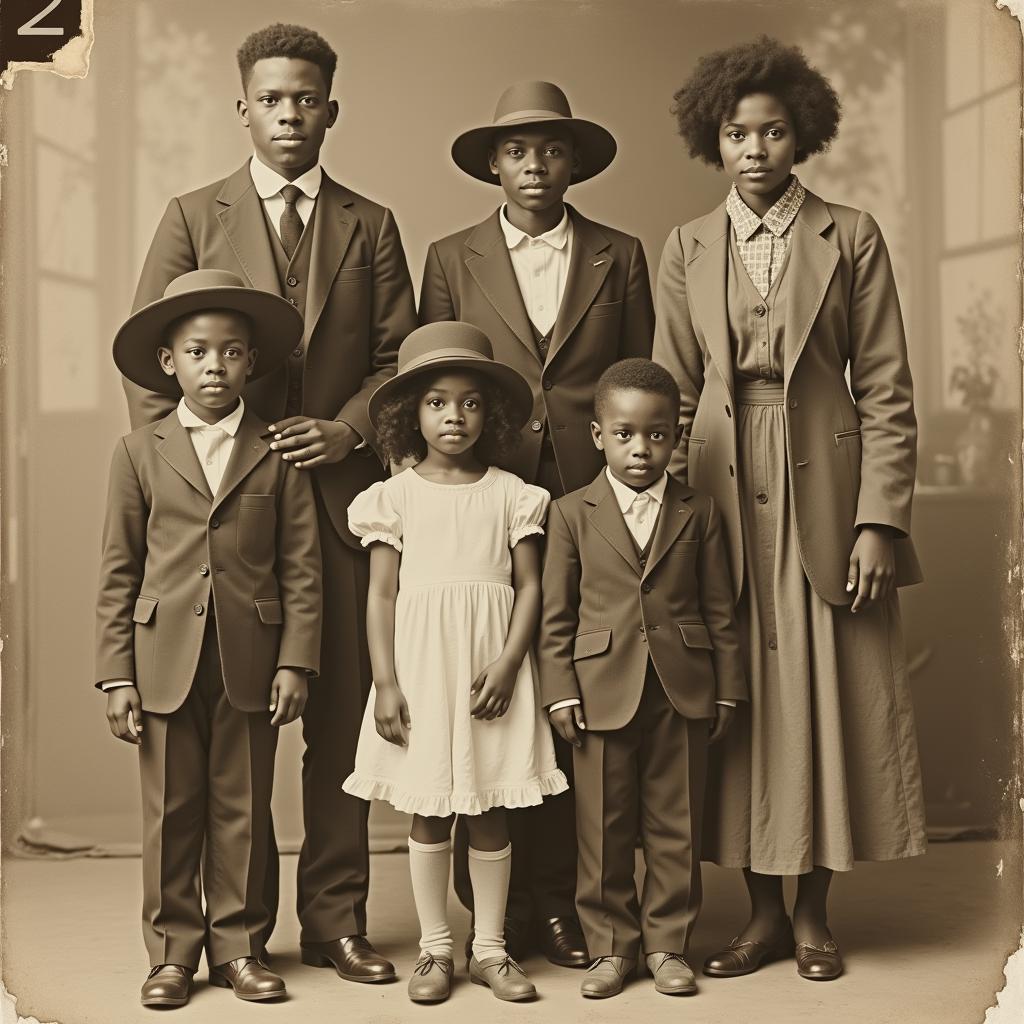Understanding the African American Experience
The African American Experience is a complex and multifaceted journey, deeply interwoven with the history of the United States. From the arrival of the first enslaved Africans to the ongoing struggle for racial equality, this experience represents a unique narrative of resilience, resistance, and cultural transformation.  Historical Portrait of an African American Family
Historical Portrait of an African American Family
A History Marked by Struggle and Triumph
The African American experience began tragically with the transatlantic slave trade. Millions of Africans were forcibly removed from their homelands and subjected to brutal conditions in the Americas. This period of enslavement, lasting for centuries, left an indelible mark on American society. The denial of basic human rights, the constant threat of violence, and the systematic dehumanization of enslaved people shaped the early African American experience. Despite these horrific circumstances, enslaved Africans maintained their cultural traditions, passing down stories, music, and spiritual beliefs that provided hope and a sense of community. After the Civil War and the abolition of slavery, African Americans faced new challenges. The Reconstruction era, while promising equality and opportunity, was met with resistance and violence from white supremacist groups.
african american experience essay
The Jim Crow era, which followed, further entrenched racial segregation and discrimination in the South. Through these struggles, however, African Americans continued to fight for their rights. Leaders like Booker T. Washington and W.E.B. Du Bois advocated for education and social advancement, laying the groundwork for the Civil Rights Movement of the mid-20th century.
The Civil Rights Movement and Beyond
The Civil Rights Movement marked a turning point in the African American experience. Led by iconic figures like Martin Luther King Jr., this movement used nonviolent resistance to challenge segregation and discrimination. From the Montgomery bus boycott to the March on Washington, African Americans mobilized across the country, demanding equal rights and an end to racial injustice.
african american people interview
The Civil Rights Act of 1964 and the Voting Rights Act of 1965 were landmark achievements, legally dismantling segregation and securing voting rights for African Americans. Despite these legal victories, the struggle for racial equality continues. Systemic racism persists in areas like criminal justice, education, and housing, creating disparities and ongoing challenges for African Americans.
What were the key achievements of the Civil Rights Movement?
The Civil Rights Movement secured landmark legislation like the Civil Rights Act of 1964 and the Voting Rights Act of 1965, legally dismantling segregation and securing voting rights for African Americans.
The Rich Tapestry of African American Culture
The African American experience has given rise to a vibrant and influential culture. Music, literature, art, and cuisine all reflect the unique history and perspectives of African Americans. From the blues and jazz to hip-hop and R&B, African American musical traditions have shaped global popular culture. Writers like Langston Hughes, Toni Morrison, and James Baldwin have given voice to the African American experience, exploring themes of identity, racism, and resilience.
african american african american
How has African American culture influenced global popular culture?
African American musical traditions, from blues and jazz to hip-hop and R&B, have had a profound impact on global popular culture.
Dr. Anika Johnson, a renowned historian of the African American experience, states, “African American culture is a testament to the power of creativity and resilience in the face of adversity.”
african americans after world war 2
The African American Experience Today
The African American experience continues to evolve in the 21st century. While progress has been made, challenges remain. The fight for racial justice and equality persists, with ongoing efforts to address systemic racism and promote social and economic opportunities for African Americans.
Professor Kwame Asante, a leading sociologist, emphasizes, “Understanding the African American experience requires acknowledging both the historical struggles and the ongoing fight for equality.”
The African American experience is a story of perseverance, strength, and cultural richness. It is a vital part of the American narrative, shaping the nation’s past, present, and future.
FAQ
-
What is the significance of Juneteenth?
-
What were the Black Codes?
-
Who were some key figures in the Harlem Renaissance?
-
What is the impact of redlining on African American communities?
-
What are some current challenges facing African Americans?
-
How can I learn more about the African American experience?
-
What are some resources for supporting African American businesses and organizations?
For further assistance, please contact us at Phone: +255768904061, Email: [email protected] or visit our office at Mbarali DC Mawindi, Kangaga, Tanzania. We have a 24/7 customer service team ready to assist you.

